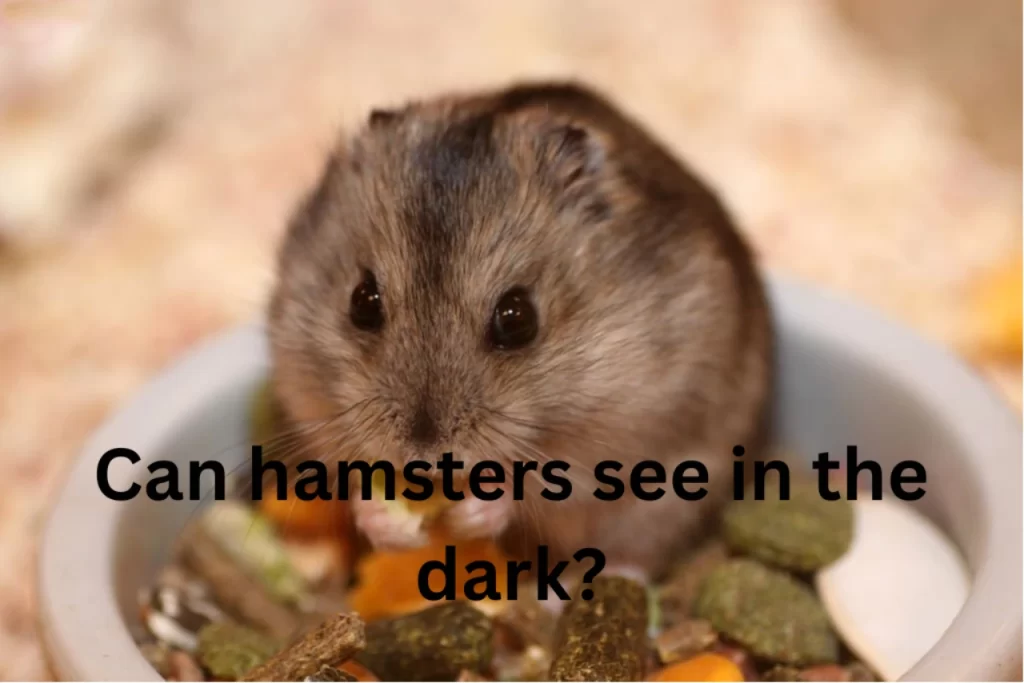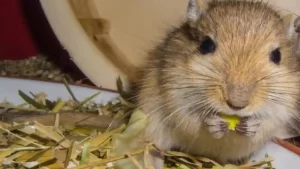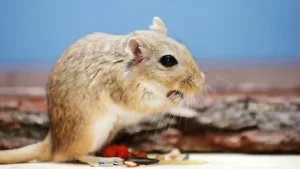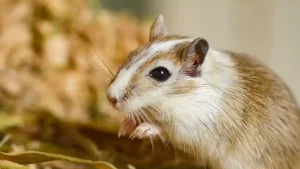Bringing a new hamster into the home is a joy in itself and we all want to know the interesting facts about this little friend. These nocturnal rodents do not tend to walk more often during the daytime because they are nocturnal animals which tells one of the facts they prefer a night light the most. But there must be one question wondering in your mind can hamsters see in the dark?
Yes, hamsters can indeed see in the dark. They have a special ability known as “night vision” which allows them to make out shapes and objects even when there is very little light available. This night vision is due partly to their large eyes, which are specially adapted for low-light conditions.
Additionally, their eyes contain an extra layer of tissue that reflects ambient light onto the retina and increases the amount of light they can detect. This gives them an edge over other animals that cannot take advantage of this type of visual adaptation.
The kind of vision hamster experiences in the dark will differ from what humans experience in daylight. Hamsters may be able to pick up more details than we could ever imagine, but their vision is still limited. They need to be within the range of a few feet to make out details, and even then they will likely only be able to distinguish shapes and colors.
It is important to remember that although hamsters can see in the dark, this does not mean that they should be kept in dark living conditions. Hamsters, like all animals, require an environment with proper lighting levels and temperatures for optimal health.
Without adequate light, a hamster’s physical and mental health may suffer significantly. Keeping your pet hamster in good condition means providing them with access to natural sunlight or UV lamps when possible so they can get the stimulation they need.
Hamsters are amazing creatures indeed! Their night vision is just one of the many fascinating adaptations they have which help them to survive and thrive in their natural environment. It is also advised to keep away kids from the hamster’s cage during day time as they like to rest most of the time.
How do Hamsters see In Darkness?
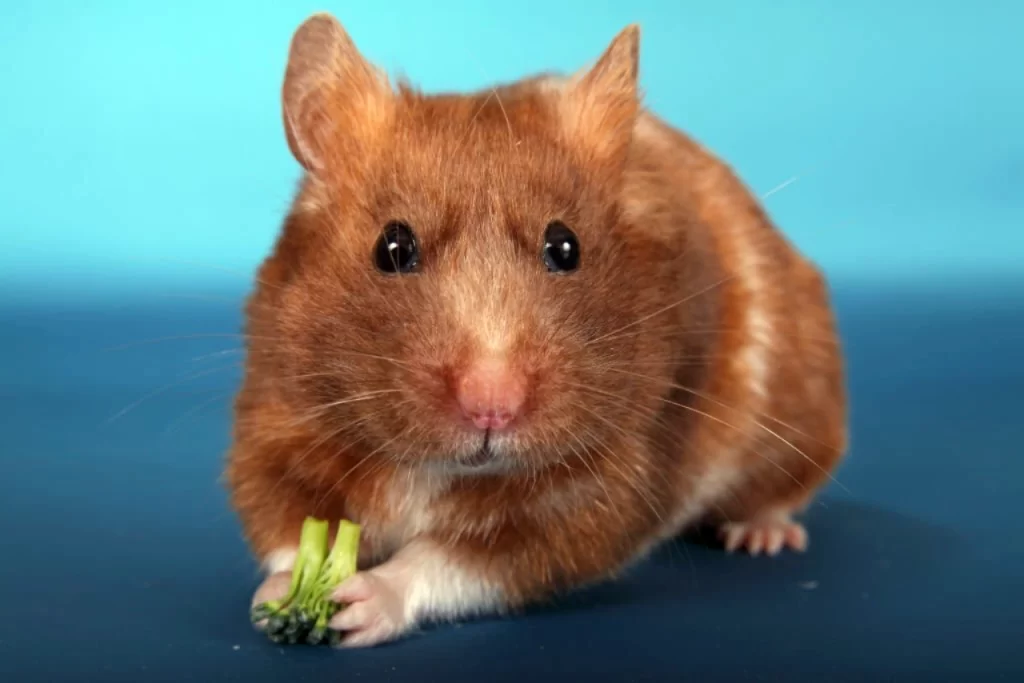
Hamsters are nocturnal animals and are naturally adapted to seeing in the dark which also make them special creature but you may also wonder how these species see in the dark.
Hamsters have the special ability to see in the dark and observe their surroundings even when there is no light present. This remarkable adaptation helps them survive in their natural habitat at night when they are most active.
The secret behind a hamster’s seeing in darkness lies in their eyes. They have evolved differently from humans, having larger eyes with more sensitive retinas that are packed with photoreceptor cells called rods.
Rods allow animals to detect shapes and movements in dim light as well as during complete darkness by picking up on available light sources such as moonlight or starlight.
Hamsters also rely on other senses like smell and hearing to help them navigate through the dark. Their acute sense of smell lets them distinguish between different smells, while their sensitive hearing helps them detect potential predators or other dangers.
In addition to these abilities, hamsters also have a special type of eye called the tapetum lucidum – a reflective layer behind the retina that reflects light into the eye, increasing its sensitivity and improving vision in low-light conditions. This unique adaptation allows hamsters to see more clearly when there is little or no light present.
All in all, thanks to their natural adaptations like large eyes with highly sensitive retinas, smell and hearing capabilities as well as the presence of the tapetum lucid, hamsters can observe their surroundings even in complete darkness!
Also Read: How Long Do Hamsters Sleep?
What is a hamster’s eyesight like?

Hamsters have relatively poor eyesight compared to humans, but they can still see fairly well in dim light. Their eyes are specially adapted to help them see clearly in low light conditions, allowing them to find food and avoid predators at night.
However, they cannot detect colors and their vision is significantly blurred beyond a few feet away. This means that your pet hamster won’t be able to recognize you from far away or even across the room!
Nevertheless, domesticated hamsters do have excellent senses of smell and hearing which helps them find food sources and become aware of potential danger. All in all, your little hamster will not be seen as clearly as you can but it will still be able to get by just fine!
How Well Do Hamsters See At Night?
Hamsters are nocturnal animals, meaning that they are most active during the night. As such, it stands to reason that they must have excellent vision in the dark, or else they would not be able to find food and navigate their environment so easily.
Hamsters do indeed have good night vision, though it is not quite as sharp as we might think. It has been found that hamsters can see very well at night using only the light of a full moon! They rely on what’s called “scotopic vision,” which allows them to detect changes in the intensity of light without being able to make out details.
In addition, hamsters also have a very wide field of view; up to 350 degrees, which allows them to see in almost all directions at once. This helps them to stay alert and avoid danger while they are out scavenging for food.
Hamsters also use other senses, such as smell and hearing, to navigate their environment at night. These senses help hamsters find food and detect predators before they get too close. Hamsters have even been found to be able to differentiate between different types of smells in the dark!
Overall, it is clear that hamsters have very good night vision that allows them to remain active during the hours of darkness. They rely on both sight and sound (as well as smell) to survive in their nocturnal world. As long as you provide your pet hamster with a safe and comfortable environment, it will be able to navigate with ease.
Also Read: 20 Best Hamster Safe Food And 10 To Avoid!!!
How do Hamster’s Eyes work In Darkness?
The great ability to see in the dark makes hamsters a special species, even when I brought this furry friend for the first time I was also eager to know how to do its eyes work during darkness.
Hamsters have a special set of eyes that allow them to see in the dark. The anatomy of their eyes is similar to other animals, however, they are specially adapted for low light conditions. Hamsters’ eyes contain more rods than cones, which allows them to see in dimmer light.
They also possess a reflective layer at the back of their eyes called the tapetum lucidum. This reflective layer helps them to capture any available light and amplify it when darkness falls, allowing hamsters to move around safely and find food during nighttime hours.
In addition, hamsters’ eyes can adjust quickly from bright lights to very little light – an adaptation that enables them to hunt down prey in dark places with ease. This adaptation is especially useful for hamsters who live in wild burrows, where light can be scarce.
With their keen night vision, hamsters can find food and make their way around without fear of predators. All these special adaptations allow hamsters to have excellent eyesight in the dark, helping them survive and thrive in their natural environment.
What Do Hamsters See?

Hamsters have small eyes and relatively poor vision. They can see in color, but not with great clarity. When looking at a hamster’s eye, you may notice that it looks somewhat close-set and beady. This is because their field of vision is much smaller than ours.
Hamsters primarily rely on their sense of smell and hearing for navigation rather than sight. It’s believed they can detect movement up to several feet away, allowing them to quickly react to potential threats or food sources nearby. Their ability to hear also helps them communicate with other members of the species.
Although hamsters aren’t able to see far distances clearly, they are still able to recognize familiar objects like their cage mate, their food bowl, and you. They are particularly good at recognizing your scent and may even come to greet you when you enter the room.
Hamsters also have an extra layer of protection in their eyes – they can close one eye while they sleep so that one side remains alert and ready to react if something moves nearby. This helps them remain safe while they’re resting or sleeping during the day.***
Do Hamsters See In Color?

The answer to this question is, yes! Hamsters can see in color. Like humans and other mammals, they have a color vision which enables them to distinguish between different colors. They can differentiate red from green, as well as yellow from blue. Furthermore, hamsters also possess excellent night vision since their eyes contain a special layer of cells that gives them the ability to see in low-light conditions. This helps them stay safe when roaming at night and foraging for food.
Hamsters also have an impressive range of peripheral vision, allowing them to detect movement from the corner of their eye. This helps them avoid predators quickly and seek out potential mates or food sources with ease. Ultimately, wild hamsters rely heavily on their sight to survive in the wild, making them finely tuned visual predators.
In conclusion, hamsters tend to see in color and have excellent night vision and a wide range of peripheral vision. This makes them well-adapted to their natural environment and helps keep them safe from predators. If you observe poor eyesight in your hamster then you must the vet for their quick recovery.
Frequently Asked Question(FAQs):
Is it okay for hamsters to be in the dark?
Yes, hamsters are very comfortable living in the dark. Many species of hamsters prefer to be in darkness most of the time, as they are nocturnal animals with activity mainly occurring at night.
A dark environment helps hamsters feel safe and secure and can help reduce their stress levels. When it comes to sleeping during the day, providing a dark hiding place is essential for your pet’s well-being.
Dark boxes or other fully enclosed spaces can help create an environment that is suitable for them to rest during daylight hours.
Do hamsters get lonely at night?
Yes, hamsters can get lonely at night. Like other pets, hamsters thrive in social environments and need companionship to stay healthy and happy. If a hamster is kept alone for too long, it may become withdrawn or develop behavior problems due to loneliness.
Do hamsters recognize their owner?
Hamsters are capable of recognizing their owners and can even be trained to respond to them. They may learn to recognize the sound of their name or the sight of their owner’s face.
As they become more comfortable with you, they may even come when called or allow themselves to be held without fear.
To make sure that your hamster recognizes you, you must spend time interacting with it each day so that it becomes familiar with your presence. Developing a routine will help your hamster feel secure as it realizes what will happen next each day.
Final Thoughts:
Overall, hamsters can see in the dark better than humans, but only to a certain extent. Hamsters have good night vision due to their large eyes and special rods and cones that are sensitive to light.
They also have a “tapetum lucidum” which reflects bright light into their eyes allowing them to gather more light information than us. While it may be true that they can differentiate between different shapes or objects in the dark, they are unable to recognize faces or details like we would in the same situation.
Due to this limitation, pet hamsters should not be expected to perform any complex tasks in the dark that require recognition of intricate details. In conclusion, while hamsters may be able to see better than us in low light, their vision is still limited compared to humans.
Therefore, for your hamster to truly explore its environment, it needs access to both light and dark areas. By providing this balance of lighting your pet will be able to get the most from its environment!
References:
1. https://www.petmd.com/hamster/nutrition/how-well-can-hamsters-see-dark
2. https://pethelpful.com/rodents/Do-Hamsters-See-in-the-Dark
3. https://www.thesprucepets.com/all-about-hamsters-1238404
4. https://www.nationalgeographic.com/animals/mammals/h/hamster/
5. https://www.petcoach.co/article/can-hamsters-see-in-the-dark/
6. https://pets.thenest.com/hamsters-see-color-1805.html
7. http://www.animalspot.net/can-hamsters-see-in-the-dark.html
8. https://smallpetstop1010.weebly.com/blog/how-well-do-hamsters-see

